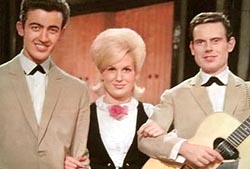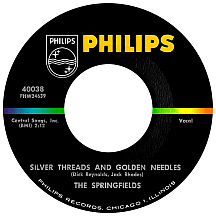THE SPRINGFIELDS
Silver Threads and Golden Needles
Mary O'Brien started right off with a love of many types of music; her brother Dion's all-consuming interest in musicianship only inspired her to dig deeper. While the two were growing up in the West Hampstead district of London, they refrained from the customary quarrels among siblings and instead practiced singing together. Dion, five years her senior, had fallen under the influence of folk music during its phenomenal rise, singing solo and with a friend, Tim Field (birth name Feild). After a marginally successful experience making records with The Lana Sisters from 1958 to '61, Mary jumped on the folk bandwagon. It was decided they would work as a trio called The Springfields (a play on Feild's name), with each member taking on a pseudonym. Dion became Tom Springfield. Mary's choice was easy; a tomboy since childhood, her oftentimes dirty appearance had resulted in the nickname "Dusty."
Signed to the U.K.'s Philips label, they went into the studio in the spring of '61 with producer John Franz and arranger Ivor Raymonde. "Dear John," a folksy-cute traditional song with freely adapted lyrics, was the first single, followed by "Breakaway," an original composition by Tom that hit the U.K. Top 50 late that summer. "Bambino," an adaptation of a Spanish folk tune, was a top 20 hit at the end of the year, but the next few releases failed to generate interest in the trio's homeland.
"Silver Threads and Golden Needles," a song written by country composer and musician Jack Rhodes with Dick Reynolds (first recorded by Wanda Jackson, it appeared as the flip side of her 1956 Capitol Records single "Hot Dog! That Made Him Mad"), was released by the Springfields in America and started gaining momentum in August 1962, reaching the top 20 in mid-September on both the pop and country charts. A bigger production than the earlier singles with prominent banjo, guitar and strings, the song's message of an empty, just-for-show love affair ('...you think I should be happy with your money and your name...and hide myself in sorrow while you play your cheatin' game...'), delivered in Jackson's original as a heartsick rebuff, came across in the group's folk remake as an unyielding, slightly angry rejection. The popular song resurfaced every few years; Jody Miller charted with it in 1965, followed by The Cowsills in '69. Then in the spring of '74, Linda Ronstadt competed for airplay with a harmonica version by Charlie McCoy.

The next single took a far more positive stance. Bob Hilliard and Sammy Fain's "Dear Hearts and Gentle People" was introduced to a mass audience in 1949 through versions by Dinah Shore, Bing Crosby and several others. For Tom, Tim and Dusty it served as a low-charting follow-up to the previous hit; the single's flip side, "Gotta Travel On" (a folk song written by Paul Clayton that was a pop and country smash in '59 for Billy Grammer) was preferred by a number of radio stations, but the act's impact in the U.S. ultimately boiled down to "Silver Threads." Back in the British isles, the group entered 1963 with revitalized popularity by way of a pair of Tom Springfield originals, "Island of Dreams" and "Say I Won't Be There," both top tens.
Their surprise stateside hit diverted the trio's attention to the U.S. folk scene; they traveled to Nashville and recorded an album, Folk Songs from the Hills, with arrangements by former Sun Records musical director Bill Justis in an attempt to capture an authentic American flavor working with producers and musicians from country music's capital. It was a novel idea at the time but suffered from a lack of originality. What resulted instead was a shift in Dusty's attitude; she became obsessed with the music she heard on U.S. radio stations (as opposed to the limited exposure the BBC and few other outlets offered back home) and from that point on there was no turning back. She decided to go solo, in the process abruptly putting an end to the still-hot Springfields, but within a few months the world would begin to develop an entirely different impression of Dusty Springfield, transformed from an image of homespun folk singer to that of a trendy, glamorous blonde icon of '60s girl power.
The group's breakup coincidentally came about just before the British Invasion of North America led by the flick-of-a-switch mania surrounding The Beatles. "I Only Want to Be With You" was Dusty's first of many contributions to music's new direction. Tim Field left his music career behind to study eastern religion; in the years since he has written many books on spiritualism. Tom Springfield continued writing songs and had a terrific run producing the recordings of Australian folk-rock quartet The Seekers. That band, led by singer Judith Durham, owes much of its success to Tom; he composed the group's biggest hits, including "I'll Never Find Another You," "A World of Our Own," "The Carnival is Over" and (with Jim Dale) the theme from "Georgy Girl," the 1966 film that made Lynn Redgrave a star.


